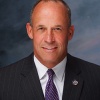One of the main reasons my colleagues on the City Council and I are attracted to local public service is that it truly is representative government. Another way to say it is that city government “works,” in the sense that it is the best example of grassroots democracy and participatory self-rule. If you ask why this is so, I would offer three thoughts: city government is accessible, it is open and it is tangible. You can easily interact with Peoria’s elected servants and administrators, stay informed of “what’s going on” by attending any number of Council and commission meetings, and directly “feel” or grasp the services the city provides.
The key factor underpinning our ability to work in this manner is our annual financial plan, our budget. Not just a document or set of numbers, the budget is a process that takes significant Council time and energy, as well as concentrated staff preparation and support. As this year unfolded, a number of us felt that we could improve the process—a process that has been characterized as being difficult to understand, even more difficult to impact, and finally, a process that crams tough decisions, such as agreeing on capital project priorities, into the final weeks of the year.
With this in mind, we asked our Interim City Manager Henry Holling and his administrative team to see if they could come up with some ideas for improving and refining this annual challenge. I’m pleased to say that not only did the administrators come up with workable and sensible improvements, but these process enhancements have been blessed by the Council. The core improvements are “right on,” in my opinion, because they totally reflect our fundamental philosophy of city government that I described in the opening paragraph.
What are these enhancements? They are five in number:
1. Increased transparency or openness
2. More opportunities for public participation and engagement
3. Stronger alignment with the Council’s goals as it seeks to represent our diverse constituency in the best manner possible
4. Increased efficiency—getting the most out of our resources in the least amount of time
5. Improved effectiveness—doing what we said we would do, and in a quality manner.
While these enhancements are closely interrelated, they begin with creating opportunities for more public participation and engagement. On August 4th, the city held two budget open houses, one at Exposition Gardens and one at the Peoria City/County Health Department. These sessions permitted citizens to learn more about the city’s budget, ask questions of staff and Council members, and fill out a questionnaire about what services they wanted, ideas they had for greater efficiency, and suggestions they had regarding how to pay for city services.
In my opinion, there is nothing but good news coming out of our efforts to improve the process and open avenues for greater participation. We received nearly 400 suggestions on how city tax dollars should be invested (functions such as public works, police and fire were among the most frequently mentioned). We have over 200 recommendations for additional or increased revenue sources (fees on certain services or commodity purchases most commonly suggested). And we heard almost 200 other ideas for controlling costs (focus more on getting “bang for the buck,” in other words, greater efficiency).
We take these thoughts and ideas seriously. As the Council and staff work in the weeks ahead to develop a budget that is sensible and affordable in a tight resource environment, we will certainly pay attention to those who took time to share their experiences and recommendations. City government works because it is local. It can work even better in a spirit of engagement and openness. That is our intent and that is our plan. iBi

